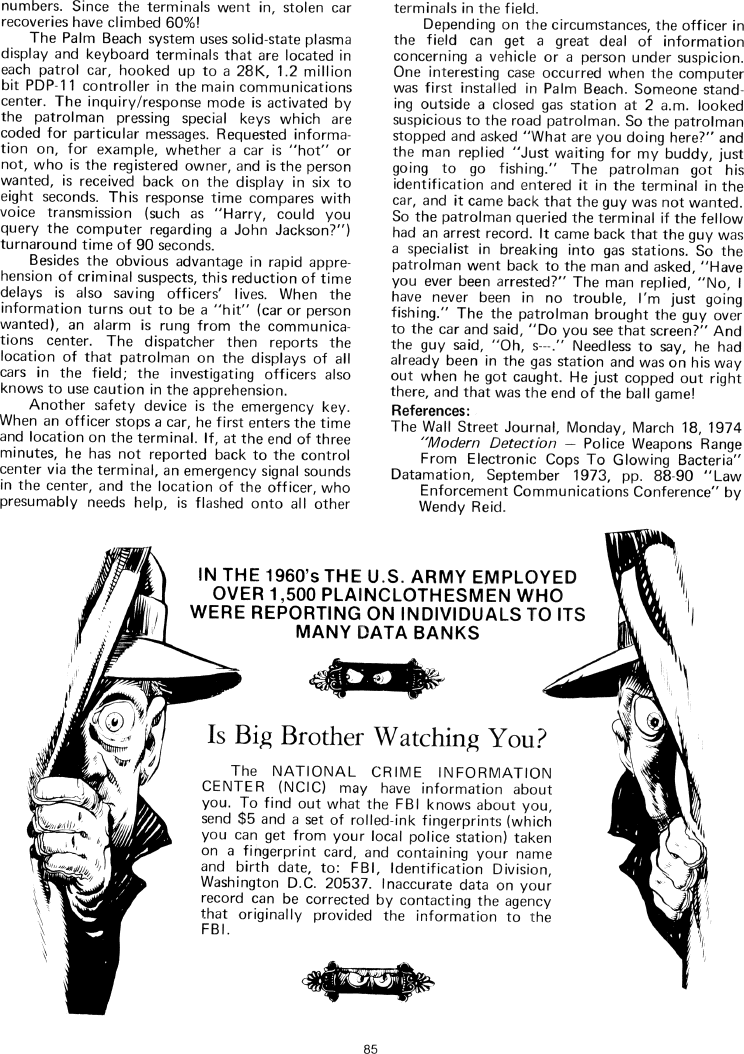The Best of Creative Computing Volume 1 (published 1976)
Crime, Cops, Computers

numbers. Since the terminals went in, stolen car
recoveries have climbed 60%!
The Palm Beach system uses solid-state plasma
display and keyboard terminals that are located in
each patrol car, hooked up to a 28K, 1.2 million
bit PDP-11 controller in the main communications
center. The inquiry/response mode is activated by
the patrolman pressing special keys which are
coded for particular messages. Requested information on, for example, whether a
car is ”hot" or not, who is the registered owner, and is the person
wanted, is received back on the display in six to
eight seconds. This response time compares with
voice transmission (such as "Harry, could you
query the computer regarding a John Jackson?")
turnaround time of 90 seconds.
Besides the obvious advantage in rapid apprehension of criminal suspects, this
reduction of time delays is also saving officers' lives. When the
information turns out to be a "hit" (car or person
wanted), an alarm is rung from the communications center. The dispatcher then
reports the location of that patrolman on the displays of all
cars in the field; the investigating officers also
knows to use caution in the apprehension.
Another safety device is the emergency key.
When an officer stops a car, he first enters the time
and location on the terminal. If, at the end of three
minutes, he has not reported back to the control
center via the terminal, an emergency signal sounds
in the center, and the location of the officer, who
presumably needs help, is flashed onto all other
terminals in the field.
Depending on the circumstances, the officer in
the field can get a great deal of information
concerning a vehicle or a person under suspicion.
One interesting case occurred when the computer
was first installed in Palm Beach. Someone standing outside a closed gas station
at 2 a.m. looked suspicious to the road patrolman. So the patrolman
stopped and asked ”What are you doing here?" and
the man replied "Just waiting for my buddy, just
going to go fishing." The patrolman got his
identification and entered it in the terminal in the
car, and it came back that the guy was not wanted.
So the patrolman queried the terminal if the fellow
had an arrest record. It came back that the guy was
a specialist in breaking into gas stations. So the
patrolman went back to the man and asked, "Have
you ever been arrested?" The man replied, "No, I
have never been in no trouble, I'm just going
fishing." The the patrolman brought the guy over
to the car and said, "Do you see that screen?" And
the guy said, "Oh, s---." Needless to say, he had
already been in the gas station and was on his way
out when he got caught. He just copped out right
there, and that was the end of the ball game!
References:
The Wall Street Journal, Monday, March 18, 1974
"Modern Detection - Police Weapons Range
From Electronic Cops To Glowing Bacteria"
Datamation, September 1973, pp. 88-90 "Law
Enforcement Communications Conference" by
Wendy Reid.
IN THE 1960'S THE U.S. ARMY EMPLOYED
OVER 1,500 PLAINCLOTHESMEN WHO
WERE REPORTING ON INDIVIDUALS TO ITS
MANY DATA BANKS
Is Big Brother Watching You?
The NATIONAL CRIME INFORMATION
CENTER (NCIC) may have information about
you. To find out what the FBI knows about you,
send $5 and a set of rolled-ink fingerprints (which
you can get from your local police station) taken
on a fingerprint card, and containing your name
and birth date, to: FBI, Identification Division,
Washington D.C. 20537. Inaccurate data on your
record can be corrected by contacting the agency
that originally provided the information to the
FBI.
85


